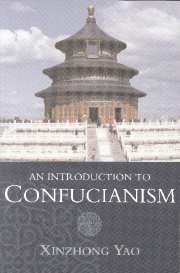
-
Select format
-
- Publisher:
- Cambridge University Press
- Publication date:
- June 2012
- February 2000
- ISBN:
- 9780511800887
- 9780521643122
- 9780521644303
- Dimensions:
- (228 x 152 mm)
- Weight & Pages:
- 0.655kg, 372 Pages
- Dimensions:
- (228 x 152 mm)
- Weight & Pages:
- 0.589kg, 361 Pages
You may already have access via personal or institutional login
Book description
Taking into account the long history and wide range of Confucian Studies, this book introduces Confucianism - initiated in China by Confucius (551 BC–479 BC) - primarily as a philosophical and religious tradition. It pays attention to Confucianism in both the West and the East, focussing on the tradition's doctrines, schools, rituals, sacred places and terminology, but also stressing the adaptations, transformations and new thinking taking place in modern times. Xinzhong Yao presents Confucianism as a tradition with many dimensions and as an ancient tradition with contemporary appeal. This gives the reader a richer and clearer view of how Confucianism functioned in the past and of what it means in the present. A Chinese scholar based in the West, he draws together the many strands of Confucianism in a style accessible to students, teachers, and general readers interested in one of the world's major religious traditions.
Reviews
‘… an excellent introduction to the Chinese sage and those who have continued to develop his ideas … valuable for students of social sciences, politics, international relations, philosophy and religion, as well as general readers interested in China’.
Source: The Times Higher Education Supplement
Contents
Metrics
Altmetric attention score
Full text views
Full text views help Loading metrics...
Loading metrics...
* Views captured on Cambridge Core between #date#. This data will be updated every 24 hours.
Usage data cannot currently be displayed.
Accessibility standard: Unknown
Why this information is here
This section outlines the accessibility features of this content - including support for screen readers, full keyboard navigation and high-contrast display options. This may not be relevant for you.
Accessibility Information
Accessibility compliance for the PDF of this book is currently unknown and may be updated in the future.


